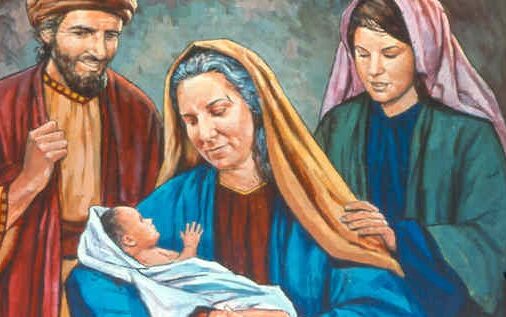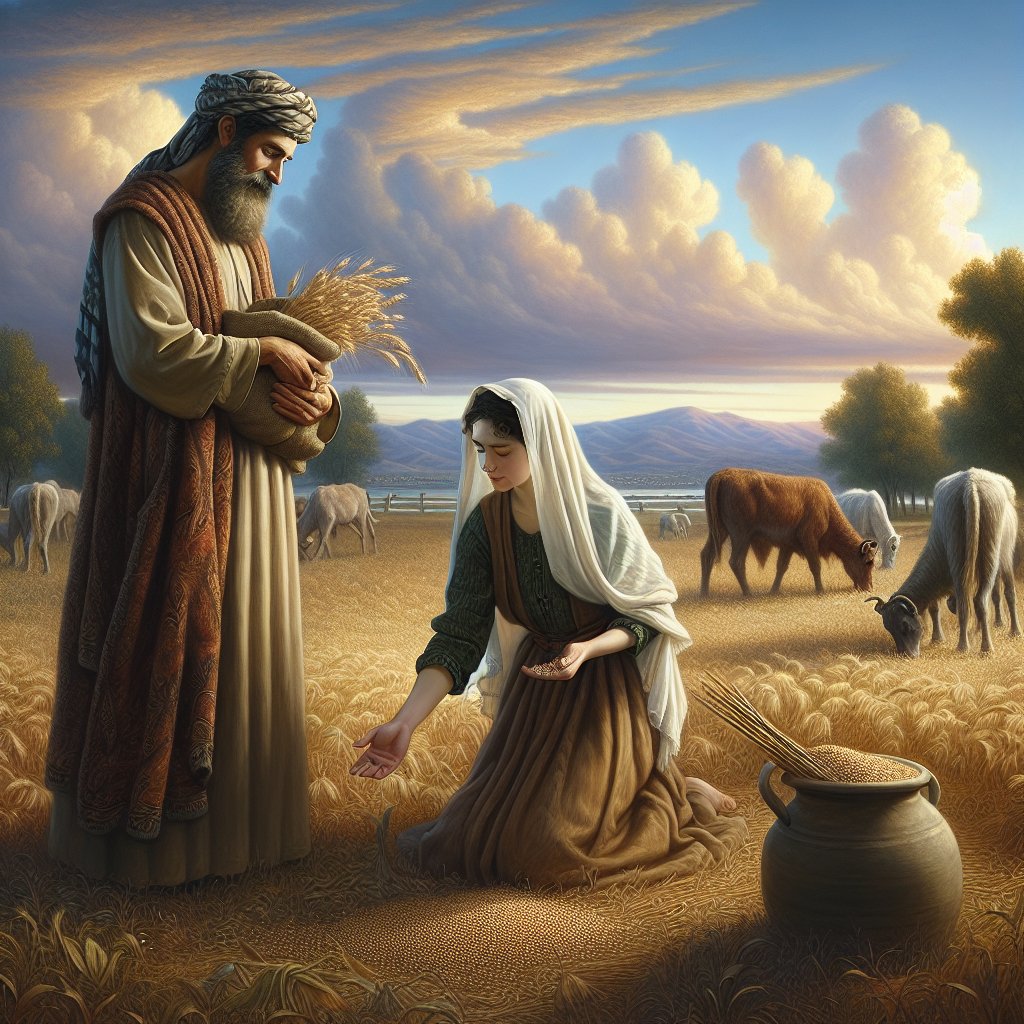The story of Ruth and Boaz, found in the book of Ruth in the Bible, is a beautiful tale of loyalty, faith, and redemption. Set during the time of the Judges, when Israel was facing turmoil and instability, this story offers a powerful message of love, devotion, and God’s providence. Ruth and Boaz’s journey not only highlights their personal character but also serves as an example for us of how faith and loyalty can lead to divine blessings and transformation.
In this article, we will walk through the story of Ruth and Boaz, exploring the key moments, the lessons they teach us, and how their faith in God guided them through challenging times.
The Background Story

The story begins with a family facing hardship. Naomi, a woman from Bethlehem, was married to a man named Elimelech. They had two sons, Mahlon and Kilion. Due to a severe famine in Bethlehem, Naomi’s family was forced to leave their homeland and move to the land of Moab, a neighboring country. In Moab, Naomi’s family lived for several years, and during that time, tragedy struck. Both of Naomi’s sons married Moabite women—Ruth and Orpah—but then, both sons passed away, leaving Naomi and her daughters-in-law widowed.
Naomi was left devastated. Her life, once full of hope and promise, had been shattered by the loss of her husband and sons. In her sorrow, Naomi decided to return to Bethlehem, as she had heard that the famine had ended, and there was food once again in her homeland. She urged her daughters-in-law to stay in Moab, where they could remarry and rebuild their lives.
Ruth’s Loyalty and Decision to Stay with Naomi
While Orpah, one of Naomi’s daughters-in-law, decided to return to her family in Moab, Ruth made a remarkable decision. Ruth clung to Naomi and refused to leave her, saying the famous words:
“Where you go, I will go, and where you stay, I will stay. Your people will be my people and your God my God.” (Ruth 1:16)
Ruth’s decision to stay with Naomi wasn’t just about loyalty to her mother-in-law; it was also a profound statement of faith. Ruth was a Moabite woman, and by choosing to follow Naomi, she was choosing a new life—one where she would leave behind her family, her culture, and her gods to embrace the God of Israel. This act of loyalty and faith is a central theme in the story, setting the stage for the unfolding journey.
Naomi and Ruth’s Return to Bethlehem
When Naomi and Ruth returned to Bethlehem, they were greeted with surprise and curiosity by the people who remembered Naomi from her earlier days. Naomi, now bitter from the loss of her family, told the people to call her “Mara,” meaning “bitter,” because of the hardship she had faced. She felt that God had dealt with her severely, taking everything from her. Yet, even in her pain, Naomi’s faith in God remained, and she trusted that God had a plan for her and Ruth.
To support herself and Naomi, Ruth decided to go into the fields to gather leftover grain. This was a practice allowed by Jewish law, where the poor and widows could collect grain that had been missed or dropped during the harvest. Ruth went to a field owned by Boaz, a wealthy and respected man from Naomi’s family. Ruth didn’t know at the time that Boaz was related to Naomi, but it was here that her path would cross with Boaz’s, and the story of redemption would begin.
Boaz Meets Ruth

Boaz noticed Ruth while she was gleaning in his fields. He was impressed by her work ethic and her kindness to Naomi. He asked his workers who she was, and they told him about Ruth’s loyalty to Naomi and how she had left her own people to care for her mother-in-law. Boaz, moved by her story, instructed his workers to allow Ruth to gather more grain than usual and to leave extra behind for her.
Boaz’s kindness didn’t stop there. He made sure that Ruth was safe while working in the fields, warning his workers not to harm her. He also invited her to eat with him and the workers during the meal, showing her the respect and kindness that she deserved.
Ruth was overwhelmed by Boaz’s generosity and kindness, and she asked him why he was showing such favor to her, a foreigner. Boaz explained that he had heard of Ruth’s loyalty to Naomi and how she had left her family and homeland to take care of her. He recognized her faithfulness and wanted to help her in any way he could. This moment in the story shows us Boaz’s character—a man of integrity, compassion, and generosity.
Ruth’s Proposal
As the harvest season came to an end, Naomi recognized that Boaz was a close relative and that he had the ability to redeem their family’s land. According to Jewish law, when a man died without a son, a close relative could marry the widow and carry on the family name. Naomi instructed Ruth to approach Boaz and ask him to fulfill this role as her kinsman-redeemer.
Naomi’s plan was risky, but Ruth, in her deep faith and trust in Naomi, followed her instructions. She went to the threshing floor where Boaz was sleeping after the harvest and uncovered his feet, lying down next to him. When Boaz woke up, he was surprised to find Ruth at his feet. Ruth made a bold request:
“Spread the corner of your garment over me, since you are a kinsman-redeemer.” (Ruth 3:9)
This was a symbolic gesture of Ruth asking Boaz to take on the responsibility of marrying her and redeeming her family’s land. Boaz, recognizing Ruth’s faith and character, was deeply moved. He praised her for not seeking a younger man, either rich or poor, and for her loyalty to Naomi and her family.
Boaz assured Ruth that he would take the necessary steps to redeem her, but there was one closer relative who had the first right to redeem the land. Boaz promised that if this man declined, he would gladly marry Ruth and fulfill the role of kinsman-redeemer.
Boaz Redeems Ruth
The next day, Boaz went to the town gate, where legal matters were settled, and he met with the closer relative. The relative initially expressed interest in redeeming the land but, when Boaz mentioned that he would also have to marry Ruth, the relative declined, not wanting to jeopardize his own inheritance. Boaz, therefore, took on the responsibility, redeeming both the land and Ruth.
Boaz and Ruth were married, and their union was blessed by God. Ruth, once a widowed foreigner, became the wife of a wealthy and respected man, and through their marriage, Naomi’s family line was preserved. The couple had a son named Obed, who would go on to become the grandfather of King David, one of the greatest kings in Israel’s history.
This part of the story is a powerful example of redemption and how God can use even the most difficult circumstances to bring about His purposes. Ruth, a foreigner and widow, was grafted into the lineage of Israel’s most beloved king, and her story serves as a reminder of God’s grace and His ability to redeem lives and circumstances.
The Legacy of Ruth and Boaz
The legacy of Ruth and Boaz is a story of faith, loyalty, and God’s provision. Ruth’s unwavering commitment to Naomi and her faith in the God of Israel were key to her being part of the story of redemption. Boaz’s kindness, integrity, and willingness to fulfill his role as a kinsman-redeemer show the importance of character and selflessness in relationships.
Ruth and Boaz’s story also has a powerful connection to the story of Jesus Christ. Just as Boaz redeemed Ruth and her family, Jesus Christ came to redeem all of humanity. The story of Ruth and Boaz is, in many ways, a foreshadowing of the ultimate act of redemption that would come through Jesus Christ. Boaz’s role as a kinsman-redeemer parallels Christ’s role in saving and redeeming us from sin.
Lessons from the Story of Ruth and Boaz
- Loyalty and Faithfulness: Ruth’s loyalty to Naomi is an example of steadfast devotion. She put others’ needs before her own and was committed to her family. Ruth’s faith in God and her decision to follow Naomi’s God, despite being a foreigner, is a powerful reminder of the importance of loyalty and trust in God.
- Integrity in Relationships: Boaz demonstrated integrity in all his dealings, treating Ruth with respect and kindness. He did not take advantage of his position but instead sought to honor God in his actions. His example shows us the importance of acting with honor, integrity, and selflessness in our relationships.
- God’s Redemption: Ruth’s story is a beautiful example of God’s redeeming love. No matter where we come from or what our circumstances are, God can redeem our lives and use us for His purposes. Ruth’s inclusion in the lineage of King David reminds us that God’s grace extends to everyone.
- Taking Bold Steps of Faith: Ruth’s proposal to Boaz was a bold act of faith. She trusted in God’s plan and took action, even when it was difficult. Her courage and trust in God’s provision remind us to take bold steps of faith, even when the future seems uncertain.
Conclusion
The story of Ruth and Boaz is one of love, faith, and redemption. Their journey teaches us about the power of loyalty, integrity, and faithfulness in relationships. Ruth’s story is a reminder that no matter where we come from, God can redeem our lives and use us for His purposes. Through their example, we learn that God’s love and grace are available to everyone, and that through faith and obedience, we can experience the blessings of His redemption.


